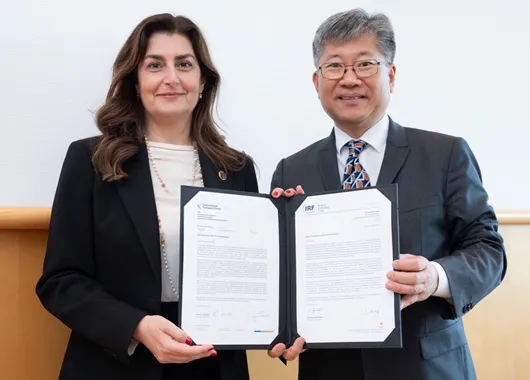French public transport company Régie Autonome des Transports Parisiens (RATP) and Tunisian public transport operator Transtu have signed a five-year cooperation and partnership agreement that will help foster exchanges between the two companies to improve their respective networks and enhance efficiency.
Cooperation between the two companies will address various transport-related activities including operations, maintenance, safety, security, passenger information and ticketing and employee training. Th
September 8, 2015
Read time: 2 mins
French public transport company Régie Autonome des Transports Parisiens (4223 RATP) and Tunisian public transport operator Transtu have signed a five-year cooperation and partnership agreement that will help foster exchanges between the two companies to improve their respective networks and enhance efficiency.
Cooperation between the two companies will address various transport-related activities including operations, maintenance, safety, security, passenger information and ticketing and employee training. The agreement includes exchanges of information and best practice, joint studies and meeting and technical inspections.
RATP will also deliver some 300 decommissioned buses to Tunisia, including 123 for the Transtu network, under the terms of an agreement with the Tunisian transport ministry. These buses, equipped with particle filters close to the Euro 3 standard, are all intended to improve uptime performance by the fleet of buses in operation and are a temporary measure pending the arrival of new buses.
“Transtu and RATP have an established partnership. The two companies signed an initial memorandum of cooperation in 2001, resulting in multiple training actions and exchanges of experience. The new agreement is a continuation of this positive drive”, commented Salah Belaid, chairman and chief executive officer of Transtu.
Elisabeth Borne emphasised that “the new cooperation agreement ensures a long-term outlook for a longstanding relationship between our companies, as exchanges between RATP and Transtu began in the 1990s*. The sale of 123 buses intended for the Tunis network is another tangible expression of our partnership with Transtu”.
Cooperation between the two companies will address various transport-related activities including operations, maintenance, safety, security, passenger information and ticketing and employee training. The agreement includes exchanges of information and best practice, joint studies and meeting and technical inspections.
RATP will also deliver some 300 decommissioned buses to Tunisia, including 123 for the Transtu network, under the terms of an agreement with the Tunisian transport ministry. These buses, equipped with particle filters close to the Euro 3 standard, are all intended to improve uptime performance by the fleet of buses in operation and are a temporary measure pending the arrival of new buses.
“Transtu and RATP have an established partnership. The two companies signed an initial memorandum of cooperation in 2001, resulting in multiple training actions and exchanges of experience. The new agreement is a continuation of this positive drive”, commented Salah Belaid, chairman and chief executive officer of Transtu.
Elisabeth Borne emphasised that “the new cooperation agreement ensures a long-term outlook for a longstanding relationship between our companies, as exchanges between RATP and Transtu began in the 1990s*. The sale of 123 buses intended for the Tunis network is another tangible expression of our partnership with Transtu”.










